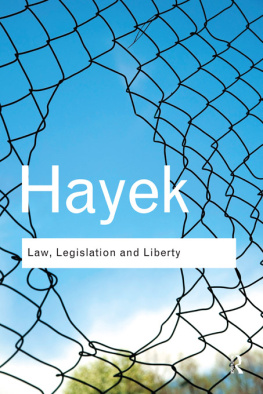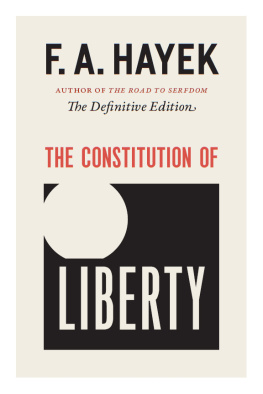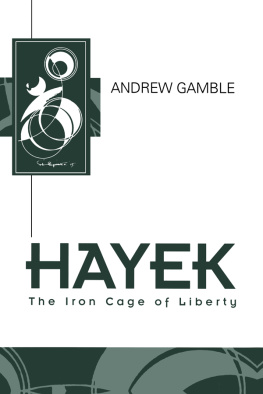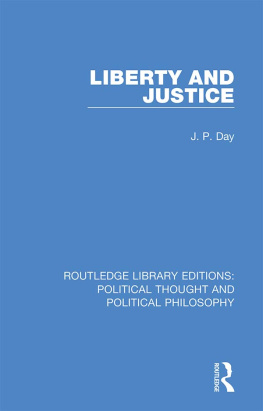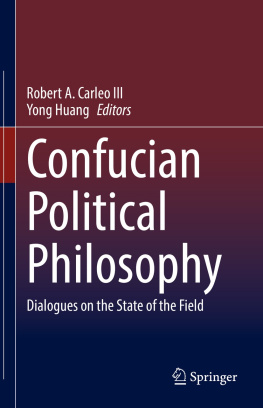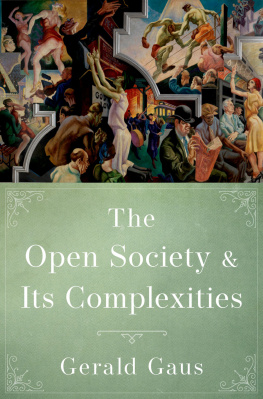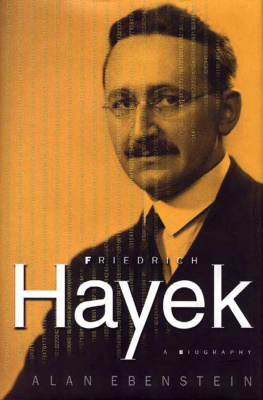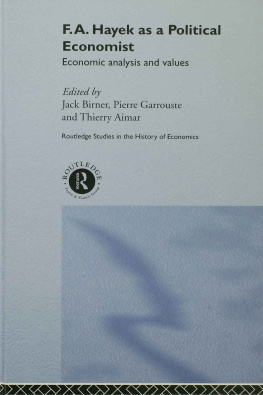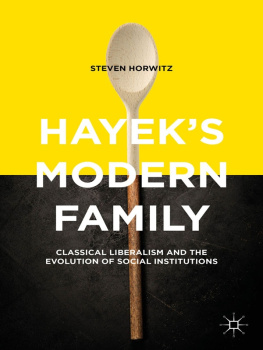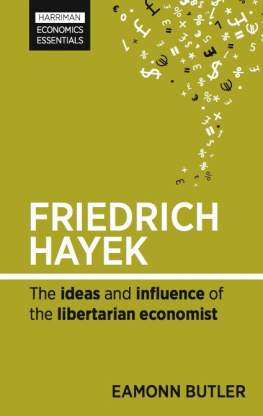Routledge Classics contains the very best of Routledge publishing over the past century or so, books that have, by popular consent, become established as classics in their field. Drawing on a fantastic heritage of innovative writing published by Routledge and its associated imprints, this series makes available in attractive, affordable form some of the most important works of modern times.
For a complete list of titles visit
www.routledge.com/classics
F. A. Hayek
Law, Legislation and Liberty
A New Statement of the Liberal Principles of Justice and Political Economy
With a new foreword by Paul Kelly
Vol. 1 Rules and Order first published 1973
Vol. 2 The Mirage of Social Justice first published 1976
Vol. 3 The Political Order of a Free People first published 1979
First published in one volume with corrections and revised preface in 1982
by Routledge and Kegan Paul Ltd.
Reprinted 1993, 1998 by Routledge
First published in the Routledge Classics 2013
2 Park Square, Milton Park, Abingdon, Oxon OX14 4RN
Routledge is an imprint of the Taylor & Francis Group, an informa business
F. A. Hayek 1973, 1976, 1979, 1982, 2013
Foreword 2013 Paul Kelly
All rights reserved. No part of this book may be reprinted or reproduced orutilised in any form or by any electronic, mechanical, or other means, now known or hereafter invented, including photocopying and recording, or in any information storage or retrieval system, without permission in writing from the publishers.
Trademark notice: Product or corporate names may be trademarks or registered trademarks, and are used only for identification and explanation without intent to infringe.
British Library Cataloguing in Publication Data
A catalogue record for this book is available from the British Library
ISBN: 978-0-415-52229-8 (pbk)
ISBN: 978-0-203-10381-4 (ebk)
Typeset in Joanna
by RefineCatch Limited, Bungay, Suffolk
C ONTENTS
properties of spontaneous orders
is the maintenance of an ongoing order of actions
of abstract rules as guides in a world in which most of the particulars are unknown
compensation for distasteful jobs
of the open and of the closed society
and education
of Power and the Dethronement of Politics
F OREWORD TO THE ROUTLEDGE CLASSICS EDITION
The global financial crisis that began in 2007 is the longest and deepest since the 1930s and has forced economists, philosophers and political commentators to revisit the assumptions and theories that have sustained politics and economic policy in advanced western economies for many decades. Friedrich Hayeks (18991992) career as one of the most prominent defenders of a liberal political order and a free market economy spans the period from the 1930s to the 1990s and as such his ideas have been amongst the most influential on statesmen and policy makers in the latter part of the twentieth century. To read his major works of political theory is to confront the political orthodoxy of much of Europe and the United States of America, to say nothing of those countries that have emerged from Soviet domination or the new rising powers of the global south, as well as a profound challenge to that orthodoxy. It is also to confront one of the major voices counselling a response to the global financial crisis. The other major voice is Hayeks intellectual companion over the same period, John Maynard Keynes. Just as Hayek led the opposition to Keynesian demand management in the 1930s from his chair at the London School of Economics, so in the early twenty-first century with many counselling a return to Keyness ideas Hayeks books continue to warn against the return of political activism in the marketplace. It would be a clich to claim that nothing has changed and that we continue to rehearse the same debates from the 1930s, but it would also be a disservice to Hayek whose ideas developed significantly in the three decades following the end of the Second World War as he moved away from economics and into political philosophy to suggest that he had completed his major intellectual contribution in the 1930s and 1940s in his debate with Keynes. Indeed, as Keynesianism seemed to sweep all before it Hayek began a much grander political project which starts with the rejection of socialism but becomes increasingly concerned with reorienting liberalism away from its twentieth-century flirtation with collectivism. This requires much more than a polemical assault on socialism or a technical attack on economic calculation, but a radical rethinking of classical liberalism for the late twentieth century and beyond. The reissue of the single-volume edition of Law, Legislation and Liberty provides an opportunity to re-familiarize the reader with one of the most subtle and intellectually ambitious defences of a free market society, just at a time when the benefits of market freedom are once again being challenged.
Law, Legislation and Liberty was originally published in three separate volumes by Routledge and Kegan Paul between 1973 and 1979. The separate volume titles Rules and Order (1973), The Mirage of Social Justice (1976) and The Political Order of a Free People (1979) give a clear sign of the direction of Hayeks thinking during the twenty years since the completion of his major contribution to liberal political theory The Constitution of Liberty (published in 1960). The Constitution of Liberty was considered an oddity for its time, as English-speaking political philosophy had largely abandoned grand theorizing in the post-war period in favour of the logico-linguistic analysis of concepts. Conceptual analysis left little or no room for the kind of first-order normative defence of a liberal regime that Hayek provides in his book. Economics became an ever more technical discipline and abandoned any overt engagement with politics. As a highly mathematical analytical language professional economics became more and more distant from the kind of political economy that had pitted Hayek against Keynes. Although Hayek was to receive a Nobel Prize for Economics in 1974 (jointly with Gunnar Myrdal) his intellectual interests had clearly moved towards political philosophy in the grand tradition of Locke, Smith, Marx and J. S. Mill.
The Constitution of Liberty was also out of its time because the combination of Keynesian demand management and an expanding welfare state seemed to have provided a viable third way between Soviet style collectivism of the sort Hayek warned against in The Road to Serfdom (1944) and the laissez-faire economic policies of the late nineteenth century in Britain and the United States. Hayek remained a lone voice counselling caution about the steady increase in state activism within the economy; yet while he retained many influential readers, his ideas were eclipsed by events as even on the political left, really existing socialism was losing out in favour of more libertarian forms of socialism and the Soviet model of centralized political direction of the economy and society had few serious defenders.

